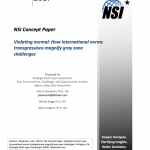Int’l Norms Transgressions Magnify Gray Zone Challenges

Violating Normal: How International Norms Transgressions Magnify Gray Zone Challenges.
Author | Editor: Stevenson, J., Bragg, B. & Pagano, S. (NSI, Inc.).
Overview
The current international system presents multiple potential challenges to US interests. In recent years, state actors, especially but not limited to Russia and China, have taken actions that disrupt regional stability and potentially threaten US interests (Bragg, 2016). Many of these challenges are neither “traditional” military actions nor “normal” competition, but rather fall into a class of actions we have come to call “gray” (Votel, 2015). Here we define the concept as: “the purposeful use of single or multiple instruments of power to achieve security objectives by way of activities that are typically ambiguous or cloud attribution, and exceed the threshold of ordinary competition, yet intentionally fall below the level of [proportional response and] large-scale direct military conflict, and threaten the interests of other actors by challenging, undermining, or violating international customs, norms, or laws.” (Popp and Canna, 2016).
Many analyses have focused on the material effects of gray zone actions and gray strategies, such as changes to international borders, or threats to domestic political stability, however few have emphasized the role that international norms play in gray actions and gray strategies, and potential response to them. This paper beings to fill that gap by exploring the normative dimensions of gray zone challenges.
The role of norms in international relations
At the broadest level, norms are rules of behavior that are recognized and understood by a community of nations. In many cases norms go unnoticed until they are violated (Goffman, 1963). International norms represent collective expectations about how other states will act and thus can have significant influence on the behavior of individual actors in the international system. In particular, they can help actors overcome some of the barriers to interstate cooperation. Norms provide solutions to coordination problems (Martin, 1992; Stein, 2004), reduce transaction costs (Ikenberry, 1998; Keohane, 2005), and provide a “language and grammar” for international politics (Kratochwil, 1999; Onuf, 2013). In some cases, such as norms regarding use of chemical weapons or the use of force to change territorial boundaries, norms have been institutionalized and become part of international law. In other cases, such as human rights, international norms reflect widely shared, but not necessarily universal, beliefs.
Among actors in the international system norms provide guidance regarding which behaviors, although not strictly forbidden or illegal are considered unacceptable and liable to censure. Regular compliance with international norms signals that we are dealing with an actor who shares our perspective on how states “should” behave (Shannon, 2000). An actor abiding by relevant norms signals the value it places on those shared standards of behavior, and its intention to play by the established “rules of the game.” Doing so many also increase the willingness of others to engage in political, economic, or security cooperation.
In essence, a pattern of adherence to norms can build trust between actors in an otherwise uncertain system. Trust is “a belief that the other side prefers mutual cooperation to exploiting one’s own cooperation, while mistrust is a belief that the other side prefers exploiting one’s cooperation to returning it” (Kydd, 2005). Trust is important component of understanding the effects of norms violations because that another actor will comply with international norms significantly reduces the kinds of uncertainty that gray zone challenges nurture. As trust deepens, reliance on norms, rather than explicitly stated and formalized rules to regulate behavior, particularly competitive behavior can increase (Bearce & Bondanella, 2007; Finnemore & Sikkink, 1998; Glanville, 2016; Katzenstein, 1996; Klotz, 1995). While international norms are generally understood by states in the global system, we cannot assume that those rules and supporting norms necessarily reflect the domestic values and interests of all states.

Comments